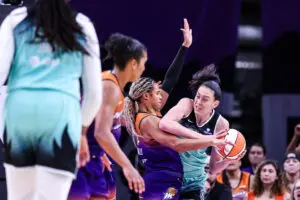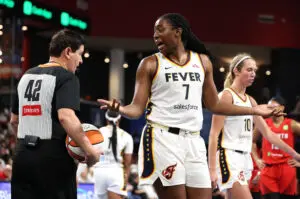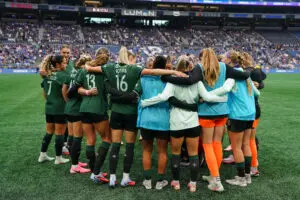The story of the 2022 Challenge Cup should be about the North Carolina Courage. Many predicted that they would have an especially difficult task this year, reshaping their team culture after multiple personnel changes to regain their place among the NWSL’s elite.
What no one expected is that the experiment would come together so fast, with newcomers like Kerolin, Diana Ordoñez and Brianna Pinto building quick chemistry with established players Debinha, Abby Erceg and Denise O’Sullivan to reload one of the most potent and creative attacks in the league. The Courage were quick to make adjustments throughout the Challenge Cup, altering their defensive press from game to game based on rotation and fitness, buying in as a unit and finding a way to defeat the reigning champion Washington Spirit in Saturday’s final.
Though North Carolina hoisted the trophy in the end, what the physical and injury-riddled championship game came to represent is much more complicated than the final scoreline.
“That’s professional sports. No matter what happens, we’re trained to just keep our head in the game and to not worry about external things,” Erceg said after her team’s tense 2-1 victory.
The Challenge Cup has served a number of purposes in recent years. It kept the NWSL alive in 2020, as the pandemic threatened to topple the league’s infrastructure. It then provided a scheduling buffer in the early months of 2021, when no one was quite sure what the sporting landscape would look like as COVID-19 vaccines became more readily available. Now, it provides teams with competitive games during the NWSL preseason and, perhaps most significantly, it’s a revenue-driving opportunity for the league and players alike.
This year’s Cup final gave the NWSL a high-profile game to slot into CBS’s flagship network schedule rather than an early regular-season game. And on Friday, HR and workforce management company UKG announced that it would help raise the Challenge Cup bonus pool to match the equivalent men’s tournament as title sponsor. With the infusion of money and exposure, the Challenge Cup in 2022 suddenly became less of a preseason kickabout and more of a results-driven competition on the league calendar.
“In our profession, $10K changes people’s lives,” North Carolina defender Carson Pickett said after the final Saturday. “When you’re competing day in and day out, it’s nice to have some kind of bonus. It’s nice to raise a trophy, but it’s also nice to have money.”
Therein lies the tension between the Challenge Cup as incentivized, and the tournament as constructed. While the players put their bodies on the line ahead of the regular season, the league isn’t necessarily holding up its end of the bargain to prioritize the actual playing of soccer. Some of the discrepancies lie with the schedule, which rewarded Cup success with a punishing three-game week, as teams balanced their regular-season openers with their Challenge Cup semifinals.
There was also the issue of venue availability, with one scheduling snafu leading the top-seed OL Reign to spend a week on the road and host the Cup semifinal in Washington, D.C. instead of Seattle. Their circumstances became more stark when a missed handball call sent them into penalty kicks against the Spirit in the semifinals. The Reign ultimately crashed out of the Cup, with little more to show for their troubles other than their $1,500 semifinal bonuses, some extra airline miles and short rest ahead of their next regular season game (and saving the NWSL the headache of explaining a predetermined 10 a.m. PT kickoff time).
Even as the league’s handle of the competition threatened to teeter out of control, players showed up on Saturday with the energy that a championship game deserves.
The match showcased what both the Spirit and Courage are capable of at their best, and what happens when outside forces get in the way of that process. The first half brought scintillating end-to-end action, with Debinha and Kerolin linking up to open the scoring in just the 10th minute.
The Spirit then tapped into the mid-game problem-solving that led them to the 2021 NWSL championship and a 20-game unbeaten streak across all competitions. Washington forward Ashley Hatch started to drop back into the midfield to receive the ball, and while the Spirit greatly missed the defensive midfield presence of Andi Sullivan, they equalized courtesy of Hatch in the 35th minute.
After halftime, however, things began to fall apart. The humid North Carolina weather combined with short rest — each team was playing its third game of the week — turned what had begun as a fun, dynamic match into a war of attrition.
“I think the quality of the game was quite low. You could tell that the players were tired, you could tell that the fatigue was sitting in, and it was just a matter of who was more fit,” Erceg said. “And I think it’s really disappointing. For a final, I think you want to see two teams that are doing really well play the best football that they can.”
Tired legs led to clumsy tackles, and when Sam Staab’s crunching tackle on Kerolin in Washington’s penalty area in the second half received no consequences from center official Ekaterina Koroleva, the momentum of the game shifted irreparably. On the following corner kick, the Courage pulled ahead thanks to an own goal from Taylor Aylmer, in a sequence that left Spirit keeper Aubrey Kingsbury on the ground after she hit the goalpost with her head. Kingsbury cleared on-field concussion protocols and stayed in the match.

Emotions were running high on both sides of the pitch, which informed the reaction to a moment no one could have prepared for. Colliding with Debinha in the 80th minute, Jordan Baggett appeared to briefly lose consciousness before being taken off the field on a stretcher with a serious head injury.
Fans at home had the surreal experience of hearing players on both teams yell for medical staff with an increasing tone of panic. Spirit players surrounded the stretcher and helped the EMTs rush it out to Baggett. While protocol was correctly followed, the moment felt indicative of the lack of control throughout the entire knockout round of the tournament.
The collision itself reflected the game’s loose play, though Baggett’s injury didn’t happen because of a referee’s decision or the Challenge Cup schedule — sometimes accidents occur in sports that are outside of anyone’s control. But when the NWSL tries to pack too many games into a short window, and simultaneously raises the stakes with financial incentives, players become vulnerable to other issues.
“I think it’s a final, things like that happen. I think the excitement and the adrenaline for players is very, very high,” Erceg said when asked about the kick she took to the ribs immediately prior to the stoppage in play.
The competitive edge they play with regardless has the ability to be the league’s greatest strength when cultivated responsibly. And even after a game in which few things could have gone more wrong, players and coaches indicated that there are internal processes available to improve the situation.
“There’s a lot of conversations behind the scenes about some of the limitations that we have in general, in terms of how we grow the product of the league, and some of the restrictions that we get from networks,” Spirit head coach Kris Ward told reporters after the game. “There continues to be talk, both from coaches and league personnel, about how we can adjust the Cup, how we can make it the best thing possible. I just think there’s a lot of different forces that are at play sometimes.”
“I think moving forward, we’ve got some people in place that are aware of the issues, and I think they’ll be rectified,” Erceg echoed.
With a title sponsor already secured, the NWSL’s plans for next year’s Challenge Cup are surely even bigger than what we saw in 2022. Now begins the work of making sure the NWSL is ready to support its players sufficiently enough to allow the product on the field to match.
Claire Watkins is a contributing writer at Just Women’s Sports covering soccer and the NWSL. Follow her on Twitter @ScoutRipley.








